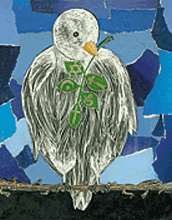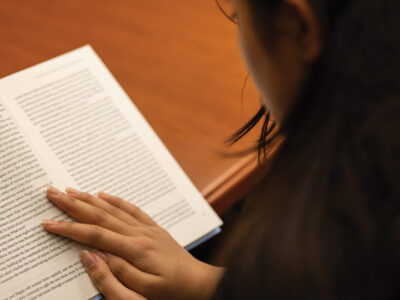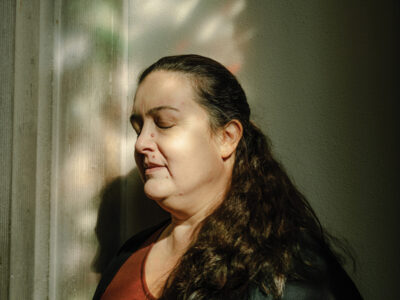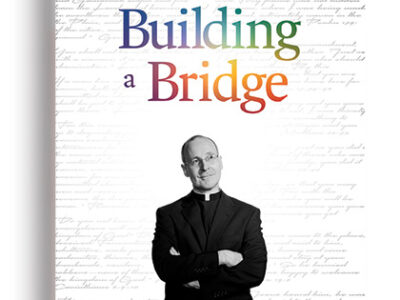
“In light of the attacks on September 11th, we have had to reconsider the relative importance of many things,” Cardinal Anthony Bevilacqua, archbishop of Philadelphia, was saying to an audience in Irvine Auditorium this past November. “But the role of religion is not one of them.”
Bevilacqua was a member of a panel discussing “Protestants, Catholics, Muslims, and Jews: Opportunities and Challenges in 21st Century America,” which was part of the “Spirit of Liberty Symposium” on religious liberty, held at Penn. The day-long symposium—which featured lectures and panel discussions by an assortment of academics, writers, clergy, and other dignitaries—was sponsored by Penn’s Robert A. Fox Leadership Program and its Center for Research on Religion and Urban Civil Society, as well as the National Liberty Museum, the American Interfaith Institute, and the Providence Forum.
“Many disturbances throughout the world are occurring among people who describe themselves as religious,” noted Bevilacqua. “We all know that the religion allegedly practiced among these people is often a caricature of what religion is meant to be. We must present authentic religion.”
At the opposite end of the spectrum was Joe Klein C’68, the “anonymous” author of Primary Colors and currently a writer for The New Yorker, who told the audience for a panel on “Religion, Media, and Public Opinion” that he was “very much a secular humanist.” In fact, he added, “When the man said, ‘O ye of little faith,’ he was probably pointing directly at me.”
Klein illustrated the complex relationship between religion and the media with an anecdote from his days working for Newsweek. While visiting a parochial school in a poor part of Chicago, he watched one of the nuns silence a classroom of screaming preschoolers with the mantra, “Find your power!”
Klein, never a strong supporter of faith-based programs, was astonished. “This flies in the face of the way people in my profession look at this issue,” he said. “The part of this story that is least likely to be written is that lives are being saved on a daily basis throughout this country by programs that are rooted in faith, and in many cases, they’re being saved where secular programs fail.” He concluded: “We shouldn’t undervalue the experience of going to a program that actually works, and writing about it.”
Klein’s fellow panelist was pollster George Gallup, whose recent surveys have revealed “a remarkable stability of religious beliefs and practices, a high level of traditional or orthodox religion, and a high level of credulity.”
He noted that a “growing number of people believe in paranormal experiences—everything from traditional religion to a belief in the supernatural, the paranormal, the psychic,” adding: “These numbers have been shooting up in an amazing way over the last decade. Somebody said that it’s not that Americans don’t believe in anything; they believe in everything.”
Later, Gallup said his firm was “engaged in a full-scale survey of Muslim nations, to discover the will of the people,” adding: “I feel this may be the most important survey we’ve ever done. It will tell us how Muslims feel about the terrorist strikes and the U.S. military response, how they feel about jihad, and very importantly, how relations with the West might be improved.”
While Professor Abdullahi Ahmed An-Na’im, professor of law at Emory University, denounced the September 11 terrorist attacks as “atrocities,” he said he hoped they might help to usher in a new era in America’s relationship with Islam.
“I see American and Muslim identities in a state of deep and profound tension,” An-Na’im added. “I see September 11th as a blessing in disguise, challenging our assumptions and complacency, forcing us to come to terms with what it means to be citizens of the world today.”
An-Na’im stopped short of endorsing America’s war on terrorism, however. “I don’t think military retaliation is the answer,” he maintained. “When the United States pursues justice and not revenge, then it will inspire magnanimity on all sides, and it will lead to a total eradication of international terrorism.”
He devoted a moment of his talk to jihad, which he said “used to be the order of the day everywhere—for acquisition of territory, for propagation of the faith, and for just simply political gain.” Now, he said, “many Muslims have argued against jihad and called for its total abolition as an Islamic doctrine.”
“In reemphasizing the importance of religion, we need more than ever to safeguard freedom of religion,” said Cardinal Bevilacqua, noting that the symposium commemorated the 300th anniversary of William Penn’s Charter of Privileges, which guaranteed religious freedom to all settlers in the colony of Pennsylvania. While “mere religious tolerance is better than persecution,” he argued, “we must strive for authentic religious freedom in order to permit society to benefit fully from religion.
“Religious freedom is so valuable that we must not base religious freedom merely in changeable laws,” he added. “Rather, we ought to see religious freedom as something inherently part of human nature, something which the Creator desires for his creatures.
“People of faith have much to learn from one another,” he concluded. “Our society is poorer when we avoid those who do not believe as we do. Society is made immensely richer when we learn from one another and put into effect through civil laws the respect for human dignity which we all have in common from God and the freedom of religion which benefits us all.”
“I am not so naive as to think we can do away with all the differences between religions,” author and Rabbi Chaim Potok observed. “I would hope to do away with the hatred those differences have elicited. Despite our divisiveness and tawdriness, there is still here the dream of dialogue, of listening; especially at this very moment. If it cannot happen in America, where on earth can it happen?”
—David Perrelli C’01




